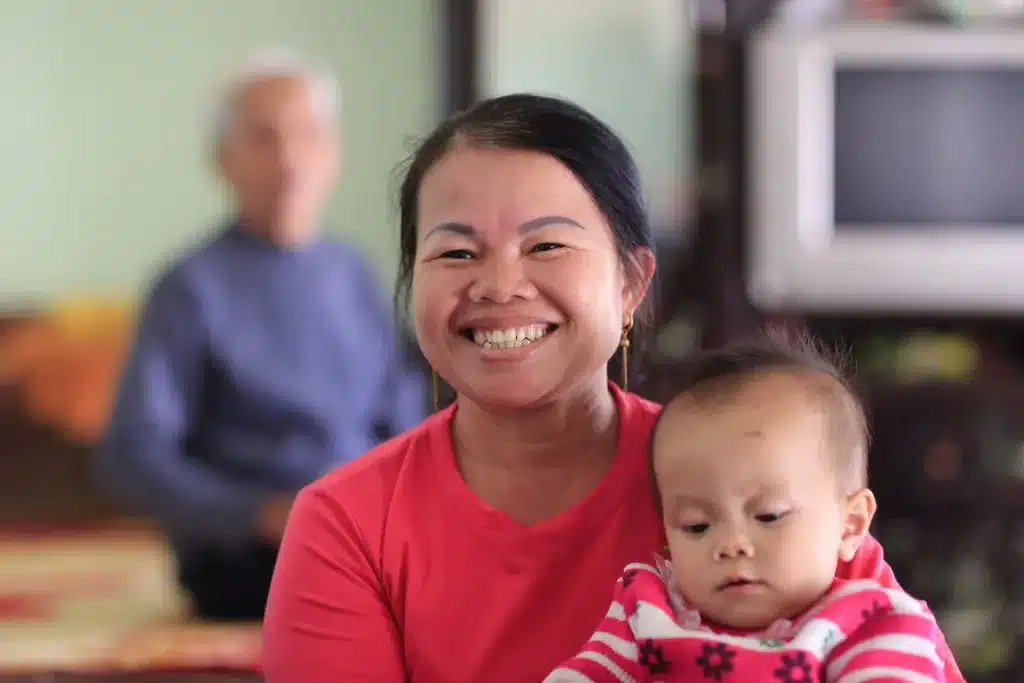More than 70 percent of workers in Viet Nam’s garment and footwear industry are women—many of them are domestic migrant workers who move from one province to another to earn a living for themselves and their families. These workers face numerous challenges. One of the biggest is caring for their (young) children while working full-time in factories. This often puts female workers in a difficult position: while some leave their children with their grandparents in their hometown, others have to take their children with them to the city, often leaving them in the hands of informal daycare facilities or even leaving them unattended in rented rooms.

Why the early years matter
According to the UNICEF report ‘Early moments matter for every child‘, the early years of a child’s life are a critical period that lays the foundation for lifelong physical, cognitive, and emotional development. During this stage, essential “executive function” skills such as attention, impulse control, and problem-solving begin to form — skills that determine how children learn, behave, and succeed later in life.
The report also warns that chronic or “toxic” stress in these formative years — often caused by prolonged hardship, instability, or lack of nurturing care — can disrupt the healthy development of the brain and body. This underscores why early care and support from parents and caregivers are so vital.
Lack of access to information on early childhood care
Yet many female garment workers still lack access to reliable information and basic knowledge about early childhood care, education, and parenting—especially during this crucial phase in their children’s lives. As parents acquire effective childcare skills and knowledge, they will be better at taking care of their children. This not only benefits the children, but also reduces stress and distraction in the workplace, ultimately leading to greater concentration and productivity among female factory workers.
To support this women workers, Better Work Viet Nam (BWV) has developed an initiative that aims to strengthen female workers’ knowledge of early childhood care. The goal is to equip them with the skills and confidence they need to care for their children while maintaining full-time employment in Better Work participating factories.
Handbook and training courses
Recognizing the need for accessible information, BWV developed a Parenting Skills Handbook for female migrant workers, based on the Comprehensive Childhood Development Guidelines issued by the Ministry of Labour, Invalids and Social Affairs (MOLISA) in collaboration with UNICEF. The handbook translates complex child development principles into easy-to-understand advice, supported by clear visuals.
To reinforce these learnings, BWV followed up with two practical training sessions in late September 2025 in Ha Noi and Ho Chi Minh City, attended by about 100 participants from factories’ medical, HR, and trade union teams. By training these key staff members—who are the point of contact for workers seeking support—BWV aims to ensure that knowledge about early childhood care reaches a much larger number of working parents on the factory floor.
The knowledge and experiences shared during the sessions benefited not only working parents but also helped promote a more caring and supportive workplace culture.
Nguyen Thi Nga, 32, medical staff member at Maxturn Apparel Co., Ltd., said:
“As a pregnant mother of two, I found the Better Work Viet Nam training incredibly valuable. The course provided essential knowledge, particularly on managing my own emotions to improve communication with my children. The easy-to-understand, visually engaging handbook was also a great resource.”
Nguyen Thi Nga plans to propose to her manager, that the factory integrates the training’s knowledge and handbooks into internal events: “I believe we can effectively reach a broader audience of parents within the workforce in my factory.”
Participants expressed great enthusiasm for the training, noting that the topic was unique compared to other BWV courses, which usually focus on occupational safety, respectful workplaces, or industrial relations. They felt that this training strengthened their knowledge and practical skills in early childhood care — empowering them to apply what they learned both at home and at work.
The handbook has since been distributed to Better Work Viet Nam’s participating factories and is being used in ongoing training courses to continue promoting knowledge and skills on childcare and parenting among workers.
These activities are part of the programme activities implemented by Better Work and funded by the Australian Department of Foreign Affairs and Trade (DFAT).